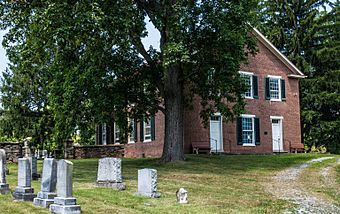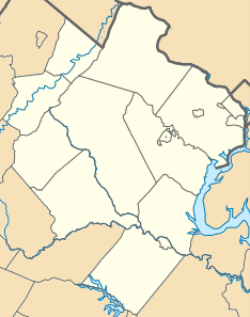Ketoctin Baptist Church facts for kids
|
Ketocton Baptist Church
|
|

Ketoctin Baptist Church, 2013
|
|
| Location | Approx. 2 mi. N of VA 7 at the jct of Allder School Rd. and Ketoctin Church Rd., Round Hill, Virginia |
|---|---|
| Area | 18.8 acres (7.6 ha) |
| Built | 1854 |
| Architectural style | Greek Revival |
| NRHP reference No. | 03000452 |
Quick facts for kids Significant dates |
|
| Added to NRHP | May 22, 2003 |
Ketoctin Baptist Church, also known as Short Hill Church, is a very old and important Baptist church building. It is located in Round Hill, Loudoun County, Virginia. This church is special because it is listed on two important lists. These are the U.S. National Register of Historic Places and the Virginia Landmarks Register. This means it is a historic place worth protecting.
Contents
History of Ketoctin Baptist Church
Early Church Groups
In 1752, church leaders from Philadelphia sent missionaries to a place called "Ketocton." They also went to Mill Creek. Their goal was to connect these churches with other Baptist groups.
On August 19, 1766, four Baptist churches decided to form their own group. These churches were Ketocton, Smith Creek Baptist, Mill Creek Baptist, and Broad Run Baptist. They created the Ketocton Association. Today, this association includes nine historic churches.
Important Decisions and Growth
In 1775, the Ketocton Association made an important decision. They voted to support the idea of separating the church from the government in Virginia. This was a big step for religious freedom.
After the American Revolutionary War, in 1797, the association suggested a gradual end to slavery. This idea caused some debate among church members.
Local stories say that the very first church building might have burned down. These stories have been passed down through families. However, they were never officially written down.
Notable People and Places
The Ketoctin Association got its name from Ketoctin Church. The name "Ketoctin" might come from the same Native American word as the nearby Catoctin Mountains.
The Ketoctin Cemetery is a special burial ground. Several soldiers who fought in the Revolutionary War are buried there.
Two important pastors from Ketoctin were David Major (1722-1796) and John Gerrard (1720-1787). They helped start many other churches in the area.
By 1820, the Ketoctin Association had grown to 39 churches. These churches were spread across 11 counties. Some churches later formed a new group called the Columbia Baptist Association. In the 1890s, the Ketocton Association changed its name. It became the Primitive Baptist Association. Its main beliefs stayed the same.
The Church Building
Design and Features
The church building you see today was built in 1854. It is a single-story building made of brick. It has a rectangular shape and a pointed roof. The building is about 40 feet wide and 55 feet long. It sits on a strong stone foundation.
The church was built in the Greek Revival style. This style was popular in the 1800s. It often uses elements from ancient Greek temples.
Inside the church, there is a special painting. It is a trompe-l'œil painting. This means it creates an optical illusion, making flat surfaces look like they have depth. A local artist named Lucien Whiting Powell (1846-1930) is believed to have painted it.
The Church Cemetery
Next to the church is a cemetery. This cemetery is also part of the historic property. The oldest grave recorded there dates back to 1777. A fieldstone wall surrounds the cemetery.
The Ketoctin Baptist Church was officially added to the National Register of Historic Places in 2003. This recognizes its importance in history.
See also
- National Register of Historic Places in Virginia
 | William Lucy |
 | Charles Hayes |
 | Cleveland Robinson |




